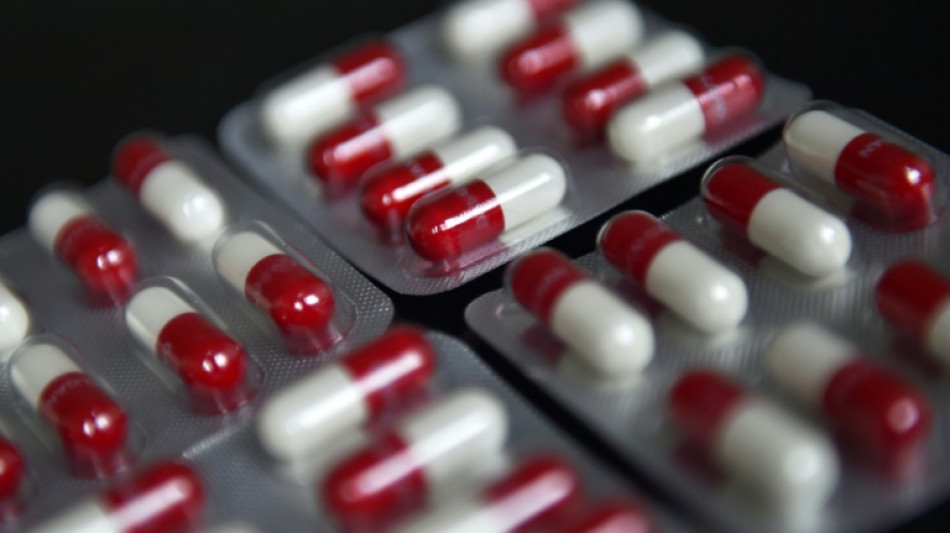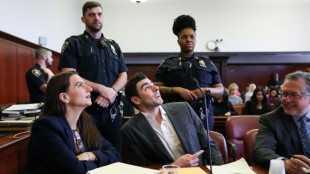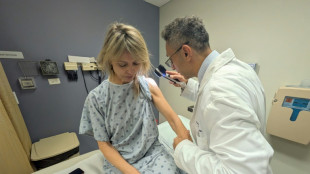
-
 Why SpaceX IPO plan is generating so much buzz
Why SpaceX IPO plan is generating so much buzz
-
Thailand continues Cambodia strikes despite Trump truce calls

-
 US envoy to meet Zelensky, Europe leaders in Berlin this weekend
US envoy to meet Zelensky, Europe leaders in Berlin this weekend
-
North Korea acknowledges its troops cleared mines for Russia

-
 US unseals warrant for tanker seized off Venezuelan coast
US unseals warrant for tanker seized off Venezuelan coast
-
Cambodia says Thailand still bombing hours after Trump truce call

-
 Machado urges pressure so Maduro understands 'he has to go'
Machado urges pressure so Maduro understands 'he has to go'
-
Best Gold Investment Companies in USA Announced (Augusta Precious Metals, Lear Capital, Robinhood IRA and More Ranked)

-
 Leinster stutter before beating Leicester in Champions Cup
Leinster stutter before beating Leicester in Champions Cup
-
World stocks mostly slide, consolidating Fed-fuelled gains

-
 Crypto firm Tether bids for Juventus, is quickly rebuffed
Crypto firm Tether bids for Juventus, is quickly rebuffed
-
Union sink second-placed Leipzig to climb in Bundesliga

-
 US Treasury lifts sanctions on Brazil Supreme Court justice
US Treasury lifts sanctions on Brazil Supreme Court justice
-
UK king shares 'good news' that cancer treatment will be reduced in 2026

-
 Wembanyama expected to return for Spurs in NBA Cup clash with Thunder
Wembanyama expected to return for Spurs in NBA Cup clash with Thunder
-
Five takeaways from Luigi Mangione evidence hearings

-
 UK's king shares 'good news' that cancer treatment will be reduced in 2026
UK's king shares 'good news' that cancer treatment will be reduced in 2026
-
Steelers' Watt undergoes surgery to repair collapsed lung

-
 Iran detains Nobel-prize winner in 'brutal' arrest
Iran detains Nobel-prize winner in 'brutal' arrest
-
NBA Cup goes from 'outside the box' idea to smash hit

-
 UK health service battles 'super flu' outbreak
UK health service battles 'super flu' outbreak
-
Can Venezuela survive US targeting its oil tankers?

-
 Democrats release new cache of Epstein photos
Democrats release new cache of Epstein photos
-
Colombia's ELN guerrillas place communities in lockdown citing Trump 'intervention' threats

-
 'Don't use them': Tanning beds triple skin cancer risk, study finds
'Don't use them': Tanning beds triple skin cancer risk, study finds
-
Nancy aims to restore Celtic faith with Scottish League Cup final win

-
 Argentina fly-half Albornoz signs for Toulon until 2030
Argentina fly-half Albornoz signs for Toulon until 2030
-
Trump says Thailand, Cambodia have agreed to stop border clashes

-
 Salah in Liverpool squad for Brighton after Slot talks - reports
Salah in Liverpool squad for Brighton after Slot talks - reports
-
Marseille coach tips Greenwood as 'potential Ballon d'Or'

-
 Draw marks 'starting gun' toward 2026 World Cup, Vancouver says
Draw marks 'starting gun' toward 2026 World Cup, Vancouver says
-
Thai PM says asked Trump to press Cambodia on border truce

-
 Salah admired from afar in his Egypt home village as club tensions swirl
Salah admired from afar in his Egypt home village as club tensions swirl
-
World stocks retrench, consolidating Fed-fuelled gains

-
 Brazil left calls protests over bid to cut Bolsonaro jail time
Brazil left calls protests over bid to cut Bolsonaro jail time
-
Trump attack on Europe migration 'disaster' masks toughening policies

-
 US plan sees Ukraine joining EU in 2027, official tells AFP
US plan sees Ukraine joining EU in 2027, official tells AFP
-
'Chilling effect': Israel reforms raise press freedom fears

-
 Iran frees child bride sentenced to death over husband's killing: activists
Iran frees child bride sentenced to death over husband's killing: activists
-
No doubting Man City boss Guardiola's passion says Toure

-
 Youthful La Rochelle name teen captain for Champions Cup match in South Africa
Youthful La Rochelle name teen captain for Champions Cup match in South Africa
-
World stocks consolidate Fed-fuelled gains

-
 British 'Aga saga' author Joanna Trollope dies aged 82
British 'Aga saga' author Joanna Trollope dies aged 82
-
Man Utd sweat on Africa Cup of Nations trio

-
 EU agrees three-euro small parcel tax to tackle China flood
EU agrees three-euro small parcel tax to tackle China flood
-
Taylor Swift breaks down in Eras documentary over Southport attack

-
 Maresca 'relaxed' about Chelsea's rough patch
Maresca 'relaxed' about Chelsea's rough patch
-
France updates net-zero plan, with fossil fuel phaseout

-
 Nowhere to pray as logs choke flood-hit Indonesian mosque
Nowhere to pray as logs choke flood-hit Indonesian mosque
-
In Pakistan, 'Eternal Love' has no place on YouTube


'It can happen to anybody': Survivors of drug-resistant superbugs
It can start during the most commonplace of incidents, such as slipping in the bathroom or injuring a shoulder playing baseball.
But once an infection with bacteria that has become resistant to common antibiotics sets in, it can be extremely difficult to diagnose -- and even harder to treat.
Antimicrobial resistance (AMR) is one of the world's biggest infectious killers, accounting for more deaths than HIV/AIDS or malaria in 2019.
And these superbugs are becoming more resistant. Recent research estimating that 39 million people will die from AMR over the next quarter century.
This often under-discussed health crisis will be the subject of a high-level meeting on the sidelines of UN talks in New York on Thursday.
Ahead of the meeting, three AMR survivors told AFP about their experience.
- 'We are all vulnerable' -
In October 2020, veterinarian John Kariuki Muhia slipped in the bathroom of his home in Kenya's capital Nairobi and broke his hip.
It required open surgery to put pins in his hip joint.
"Immediately afterwards, I became very, very ill," he said.
He was given a range of antibiotics, but none helped. Neither did more surgery to remove the pins.
His doctors feared they would lose him. Then he got Covid.
"I was fighting for my life," he said.
After five months in hospital, he was sent home but remained bedridden.
Kariuki Muhia said he was "lucky" to have studied AMR, so he suspected it could be what was afflicting him.
So he had an antimicrobial susceptibility test, which tried out 18 different antibiotics on his infection.
One worked and by November 2021 he was considered recovered.
But he is now "a permanently disabled person," having lost nearly eight centimetres (three inches) from the length of his right leg.
Kariuki Muhia, who will address the UN meeting on Thursday, emphasised that "we are all vulnerable" to AMR.
"Something has to be done."
- A seemingly 'boring' injury -
While throwing a baseball around as a teenager in the early 2000s, Anthony Darcovich tore the rotator cuff in his right shoulder.
It was a relatively "boring" injury in the eyes of the doctors, the now New York-based 34-year-old said.
He had a series of surgeries aiming to fix his shoulder and stop the pain. None worked.
Before undergoing each operation, he was given standard antibiotics to avoid infection.
After the seventh surgery in the mid-2010s, doctors discovered an infection in his shoulder that was resistant to antibiotics.
"Unknowingly, each surgery was spreading the infection further," he said.
From there, Darcovich underwent 12 more surgeries to remove the "infected hardware" in his shoulder, such as anchors, screws and a cartilage transplant.
His joint was "completely destroyed" and he needed a total shoulder replacement.
"It's something that I'll be recovering from for a long time," he said.
"The end goal would be that I'm able to lift my arm to shoulder height."
Darcovich is different to many other AMR cases, because the bacteria that infected his shoulder is normally benign -- in fact, it usually causes acne.
But because the bacteria was antibiotic-resistant, once it was in his shoulder joint it spread and caused damage.
"Everyone will get some sort of infection over the course of their life," said Darcovich, who is now an AMR patient advocate.
"We've lived in a world where more often than not, we're able to treat many of those infections quite effectively... but in the context of resistance, that assumption no longer holds."
- 'Completely shattered'
Bhakti Chavan had just finished her studies in the Indian city of Mumbai in 2017 when she noticed swelling on the side of her neck.
Her doctor prescribed antibiotics, but the swelling did not go down, said the 30-year-old clinical researcher.
After some testing, she was diagnosed with drug-resistant tuberculosis, a common and dangerous form of AMR.
"I was completely shattered," Chavan said.
First and second-line drugs did not work, but Doctors Without Borders gave her access to two new drugs.
She suffered from depression as she endured the often harsh side effects.
She also feared telling anyone because of the "stigma" around tuberculosis, though she was not infectious.
After two years of treatment involving eight different antibiotics -- including "daily painful injections for eight months" -- she is now in good health.
Still, she fears that too few people -- including some doctors -- are unaware of the threat posed by AMR.
"It can happen to anybody," she said.
A.Jones--AMWN

